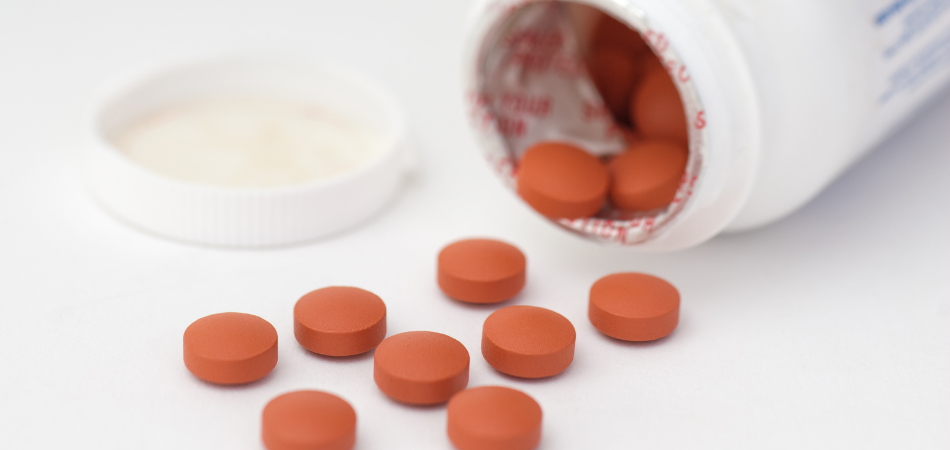
Written by:

Medically Reviewed by:
Last Updated:
August 13th, 2025
Mixing Ibuprofen and alcohol is often something people question the safety of and what dangers it possesses.
Ibuprofen is a pain reliever used to treat a variety of symptoms, from muscle aches to migraines. An over-the-counter medication, ibuprofen can be purchased at a reasonable price without a prescription. Due to its popularity in relieving symptoms of mild to moderate pain, people do not usually think twice about ibuprofen and some of the dangers associated with its use. However, this medication can pose risks, especially when used in excess or taken alongside other substances such as alcohol.
Can you mix ibuprofen and alcohol?
According to the NHS, drinking small quantities of alcohol whilst taking ibuprofen is usually safe. However, it is advised that users never take more than their recommended dosage, paying close attention to the fine print on the medication before they ingest it. With this information in mind, individuals can then make an informed decision, ensuring they are taking ibuprofen and drinking alcohol in a way that is not harmful to their health.
What happens if I drink a lot of alcohol while taking ibuprofen?
If you are taking ibuprofen for pain relief whilst ingesting large quantities of alcohol, it is important you take adequate measures to protect your wellbeing, as doing so for extended periods of time has the potential to be dangerous.
Dangers of mixing ibuprofen and alcohol
Typically, people will not endeavour to abuse ibuprofen and alcohol, as no attractive side effects arise from combining them both. For example, where some individuals might mix substances like alcohol and benzodiazepines for an increased high, taking ibuprofen alongside alcohol induces no such sensations. However, using both simultaneously can still come with side effects, some of which include:
Kidney dysfunction…
Those who have been abusing alcohol for a long time can experience impaired kidney function as a result of excess drinking. This is also the case with long-term ibuprofen use, putting individuals that take both substances concurrently at a heightened risk of kidney damage.
Lethargy…
Alcohol is a depressant, with side effects including sluggishness and decreased alertness. As ibuprofen can be used to alleviate pain, its potential for relaxing the body can also translate to feelings of tiredness or lethargy. Therefore, when mixing both substances, individuals can experience symptoms like disorientation, slowed reaction times and poor coordination.
Gastrointestinal problems…
Unfortunately, heavy ibuprofen use can increase the risk of stomach ulcers and internal bleeding. For those who consume alcohol on a daily basis, their likelihood of developing these issues can increase. Signs of gastrointestinal problems as a result of alcohol and ibuprofen use include:
- Severe abdominal cramping
- Vomiting blood
- Shortness of breath
- Feeling faint or dizzy
Spotting the signs
If you have looked at the above information and are beginning to question whether your consumption of alcohol and ibuprofen is safe, it is important to take a look at your intake, as spotting the signs early on can make all the difference in protecting your health and safety. Some more general physical signs can include:
- Nausea and vomiting
- Lack of coordination
- Headaches
- Extreme fatigue
How much ibuprofen is safe?
Ibuprofen can come in varying strengths, with tablets sold in 200mg, 400mg or 600mg doses. Dependent on their specific needs, individuals can also purchase the medication in sachets or as a cream, dissolving it in water or applying directly to the skin for more targeted pain relief. As ibuprofen is sold in unique forms and doses, users are always encouraged to check the label, ensuring they do not accidentally take more ibuprofen than has been recommended by a doctor.
In general, adults can typically take up to two ibuprofen tablets every four to six hours, but it is advised that they take no more than 1,200mg of the medication every twenty-four hours. However, this advice will differ for those with health complications or children under the age of sixteen, so always consult the leaflet if you are unsure.
How much alcohol is safe?
The number of alcohol units advised for one person will differ from those recommended to another. This is because of varying factors, some of which include:
- Gender
- Age
- General state of health
Bearing this in mind, it is difficult to provide a precise figure for how much alcohol is safe to drink, and we would recommend consulting with a medical professional for more specific information. However, from a more general perspective, alcohol guidelines state that it is recommended for adults to drink no more than 14 units of alcohol per week. This equates to:
- Six medium glasses of wine
- Six pints of beer
- Seven 50ml measures of spirits (such as rum or whisky)
With this information in mind, you can make a better prediction about your alcohol consumption. We would like to remind you, however, that there is no such thing as totally ‘safe’ drinking, but that with these guidelines, you are offered a good basis for consuming alcohol in a way that causes reduced damage to your health.
Is ibuprofen addictive?
While ibuprofen is not considered an addictive substance, it can still be unsafe when ingested alongside high doses of alcohol. In fact, some of those most at risk of developing health complications associated with ibuprofen include those struggling with addiction. Therefore, it is very important that if you are experiencing signs of alcohol addiction, you closely monitor your ibuprofen use.
How we can help
If you would like any more information about mixing ibuprofen and alcohol, contact our admissions team today. With their guidance, you can talk through some potential recovery routes and how to access the best care as soon as possible.





